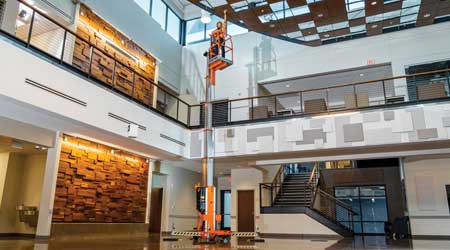 In making equipment decisions that involve researching a unit’s size, reach and lifting capacity, managers also need to keep in mind that technicians require training on the safe and effective use of MEWPs.
In making equipment decisions that involve researching a unit’s size, reach and lifting capacity, managers also need to keep in mind that technicians require training on the safe and effective use of MEWPs.MEWPs: Myths, Misconceptions, Misinformation
Manufacturers offer strategies and tactics managers can use in selecting training on mobile elevating work platforms
Despite the efforts of standards organizations and manufacturers to emphasize the importance of training and clarify the requirements, many managers still make decisions based on misinformation. For example, managers might believe that MEWP users do not need training in some cases.
In fact, Smith says, “Training is required for operators and their supervisors per the ANSI standards. Training is not optional.”
Misinformation also related to the training providers themselves.
“One of the most common misconceptions is that anyone can provide MEWP training,” Deatherage says. “This is not the case, and MEWP training should only be provided by qualified personnel.” He also emphasizes the need for depth and breadth of training.
“Operators and managers often assume that they only require machine familiarization,” he says. “This is only part of the process. An operator should complete a full operator training course and then be familiarized on each type of MEWP that he will be working on.”
Managers trying to find applicable appropriate training for MEWP operators also might make assumptions about the time required.
“One of the more critical issues is the number of entities that promote that they can provide operator training in 30-45 minutes, which is not possible,” Owyen says. “I have spoken with many operators who received their operator’s card after viewing a 20-minute machine walkaround with no mention of the other critical information required in the standards. An appropriate MEWP operator training course should take three to six hours or more, depending upon the class size and the number of classifications covered.”
Perhaps the most common MEWP-related myth involves exactly what the training enables the operator to do.
“Another common misconception is that once an operator has been trained on a MEWP, they are qualified to operate all MEWPs, which is not the case,” Owyen says. “Operators must be trained by a qualified person on the specific classification of MEWP that they will be operating, and then they must receive familiarization training by a qualified person on the specific model of MEWP within that classification prior to using the machine.”
He adds one important point of emphasis.
“In the United States only, under the ANSI A92.22-2018 Safe Use standard, if authorized by the user, a properly trained operator can self-familiarize on any MEWP within the classification on which they have been previously trained, by reading, understanding and following the manufacturer’s operator’s manual for that specific model.”
Considering all of these issues can create a complex decision-making process for managers, but the ultimate goal of that process is to find MEWP training that fits the specific needs of their departments and facilities and supports safe and productive maintenance projects.
“Well-designed instruction will ensure that information is presented in a logical fashion, key points are reinforced, and performance is evaluated,” Deatherage says.”Regardless of the delivery method, it is critical that the participants apply the lessons learned, both knowledge and performance-based, in a realistic environment to ensure learning has taken place. It is more important to select a reputable training resource that offers a variety of training options and that understands how to train personnel.”
Related Topics:










